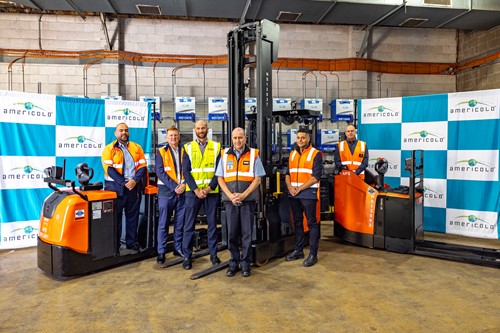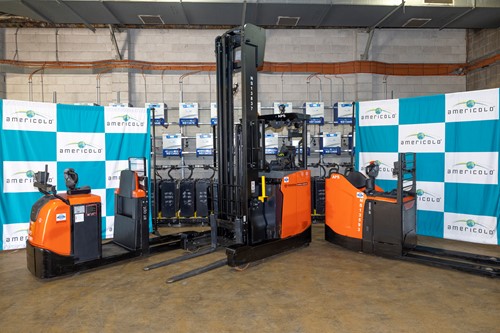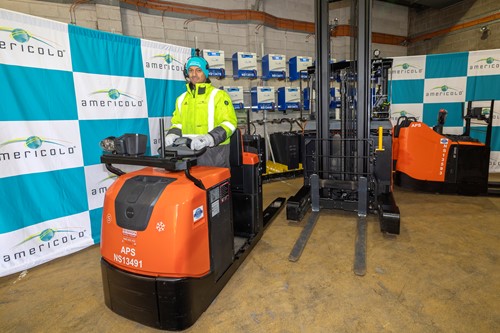Toyota Material Handling Australia has partnered with Americold to deploy a cold-ready Toyota forklift fleet across 12 national sites.
Cold chain logistics provider, Americold, has awarded a national tender to Toyota Materials Handling Australia (TMHA) to supply a fleet of material handling equipment across multiple sites. Americold opened the tender for applicants in late 2022 to upgrade its fleet of equipment.

As operational demands evolved, the company began exploring emerging technologies to support ongoing reliability, operator comfort, and safety – particularly in the challenging conditions of cold chain logistics and storage environments.
Initially, Americold shortlisted four potential suppliers, before awarding the tender to TMHA.
“Toyota presented a compelling case across several key areas – and it wasn’t just about price,” says Jonathan Bolton, Vice President of Operations Support APAC, Americold.
“While cost is always a factor, having been in the logistics industry for a long time, I know that decisions based purely on price can lead to a race to the bottom – and ultimately, you get what you pay for”.
“For us, it was also about service capability, aftersales support, and the reliability of the equipment” he added.
After a 12-month evaluation process that involved detailed site visits, stakeholder engagement, and hands-on equipment demonstrations, TMHA emerged as the successful bidder.
The Moorebank facility, also known as Toyota Material Handling Australia’s Customer Experience Centre, played a pivotal role during the Americold tender process. It served as the central location for an immersive, hands-on evaluation day, to where Americold flew in team members from across their Australian and New Zealand operations.
Hosted by TMHA representatives including Corporate Account Manager Brent Heib, Raj Gabbi, and members of the senior executive team, the visit to the Moorebank facility was a key milestone in the evaluation process.
Designed to offer a comprehensive understanding of Toyota Material Handling Australia’s capabilities and values, the day gave Americold stakeholders a firsthand look at what a long-term partnership with TMHA would look like.
Americold attendees were given the opportunity to experience interactive equipment demonstrations, allowing them to observe the machinery in action and gain a practical feel for how it would perform in a cold storage environment. As Jonathan explained, Toyota’s open approach left a strong impression.
“The first thing that stood out, for us, was how Toyota gave our team full access to test the equipment firsthand,” he says. “They encouraged our operators to drive the different units, assess which models best suited our operations, and evaluate the available technology across the fleet”.
“Just as importantly, Toyota demonstrated their ability to maintain and service that equipment over the long term. It was clear that Toyota wasn’t just looking to win the tender – they were genuinely interested in building a long-term partnership with Americold.”
Brent explained that this focus on long-term collaboration, rather than a transactional sale, was central to Toyota’s pitch.
“We just really wanted to show Americold what we’re all about – that we weren’t just trying to sell them forklifts, but that we were keen to partner with them for the long term,” he says.
The new Toyota forklift fleet features a range of electric materials handling equipment tailored to the demands of cold chain logistics and storage operations.

At the core are RRE160H reach trucks, OSE250 low-level order pickers, and electric counterbalance forklifts from the 8FBE and 8FBN series – all selected to meet Americold’s specific site and operational needs.
The rollout also included upgrades to battery infrastructure across several locations, with selected sites transitioning to Thin Plate Pure Lead (TPPL) battery systems in partnership with Enersys.
Additional enhancements to battery room facilities were delivered in collaboration with Philadelphia Scientific, supporting improved efficiency and long-term fleet performance. In total, the fleet rollout includes 530 materials handling units, which were fully deployed last month.
A second phase of approximately 200 additional units is expected to follow in 2026 and 2027, contingent on the performance and outcomes of the initial rollout. The rollout began in Tasmania, followed by Western Australia, Queensland, New South Wales, and Victoria. In total, 12 sites across Australia are being equipped with the new fleet, tailored to the operational needs of each location.
While most states saw smooth implementation, New South Wales presented some logistical challenges due to space constraints and the transition from the previous equipment.
“In New South Wales, the main challenge was logistical – coordinating the removal of the incumbent fleet while ensuring there was enough space to stage batteries, trucks, and incoming deliveries,” Brent explained. “But overall, the rollout has gone really smoothly.”
In Queensland, minor delays were experienced due to lead times on American-built equipment, though this was mitigated by TMHA’s provision of short-term rental units to maintain continuity. Brent explained that TMHA met the challenge with a proactive and flexible approach, ensuring disruptions were kept to a minimum.
“TMHA addressed the issue proactively, keeping Americold informed and supplying short-term rental units to maintain operations,” Jonathan says.
“We’re still supporting a few sites with rental gear, supplementing any shortfalls to ensure continuity” Brent added.”
Despite the scale and complexity of the deployment, TMHA’s local support teams, site-level familiarisation training, and ongoing collaboration with Americold helped ensure a smooth transition at each location.
“It’s been excellent,” said Jonathan. “We started the rollout in Western Australia just before Christmas, which is when we see our highest volumes. In WA – and across all states – we service major retail and quick service restaurant customers, so it’s a peak period”.
“If there had been any issues during the changeover, it could have impacted our ability to supply customers and keep food on the shelves in supermarkets. But we had confidence in Toyota’s ability to support us through that transition, and it went seamlessly. We were very happy with the result in WA, and from there, we were able to continue the rollout across the eastern states”.
“It’s been a really good project. There’s still more equipment to come, but we’re very happy with how it’s been managed so far.”
Operating in sub-zero environments placed additional demands on the equipment selected for Americold’s fleet. One of the key requirements outlined in the tender was that all units be suitable for use in cold storage and freezer conditions, with the durability and design to maintain performance in temperatures as low as −25 °C.
“Much of our equipment runs in freezer environments at −22 °C, and in chillers at 4° C,” Jonathan said. “That creates a unique set of challenges – not only in terms of battery life, but also in how components respond to those conditions over time.”
To meet these demands, Toyota supplied equipment configured for low-temperature use, with compatible components, robust seals, and battery technology suited to extended operation in cold environments. These features were critical to ensuring reliable performance across Americold’s 24/7 high-volume distribution operations – where uptime is non-negotiable.
As with any national rollout of this scale, the transition came with a few early challenges – most notably around operator adjustment and some minor engineering refinements.
One of the primary hurdles was operator change management. Brent noted that many forklift operators were accustomed to the layout and controls of the previous equipment and even small differences – such as the location of a horn button – required a period of adaptation.
“We’re talking about muscle memory,” he explained. “Operators want to come in, and be able to service Americold’s customers without a dip in productivity – and when something changes, even slightly, it can take time to get used to.”

To smooth the transition, TMHA provided early units for familiarisation training at each site ahead of the full rollout. This gave operators the opportunity to get hands-on experience with the new fleet, reducing familiarisation time and potential downtime when the broader deployment commenced.
“The equipment is very new, so naturally our operators are still adjusting – like getting used to a new car, it takes a bit of time,” Jonathan says. “But the support from Toyota has been excellent.”
“As with any major changeover, there have been a few minor issues to manage along the way, but Toyota’s responsiveness has been outstanding. They’ve been quick to address any concerns and very supportive throughout the process.”
The initial term of the agreement spans six years, covering the full deployment, servicing, and support of the fleet. However, both parties are already looking beyond that horizon.
With Americold continuing to expand its operations across Australia and New Zealand, discussions are underway regarding additional equipment and support for new and acquired sites. TMHA’s performance so far has helped lay the groundwork for a broader strategic partnership.
“They’ve already started talking to us about more equipment and new locations,” Brent says. “That tells us they’re confident in how the rollout has gone – and that’s a great position to be in.”
Both teams remain focused on continuous improvement, with regular collaboration around fleet performance, operational refinements, and future technology upgrades. For Americold, the goal is clear: long-term reliability, supported by a partner they trust to evolve with them.
“The initial agreement covers six years, but we always aim to build long-term partnerships,” Jonathan said. “Many of our customer relationships have spanned 30 years or more, and we take a similar view with our suppliers”.
“If we find a good partner and it’s working well for both sides, there’s no reason not to continue. Toyota has shown a strong commitment to ongoing investment in technology – not just in terms of equipment reliability and engineering, but also in operator safety, energy efficiency, and overall performance.
“We’re keen to be part of that journey.”
(Article reprinted with permission from MHD Magazine.)